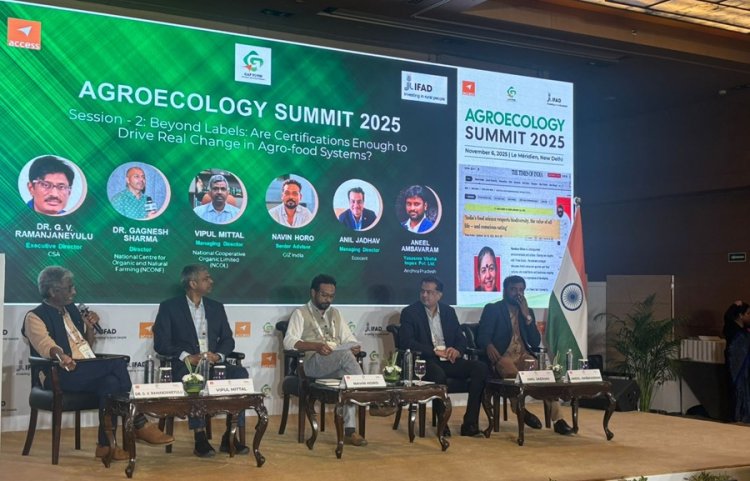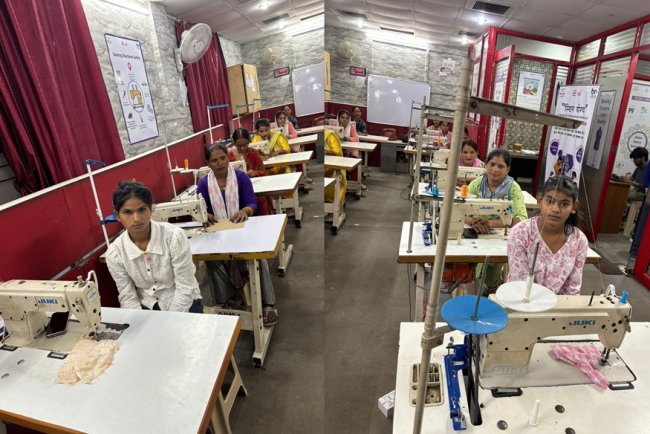India’s Organic Shift Stumbles on Trust and Certification Gaps
India’s push for organic and natural farming is being slowed by weak certification systems, poor verification, unused data and a growing trust gap between farmers, markets and regulators

India is talking about organic and natural farming at a scale never seen before. Government missions, state programmes, and global market interest have pushed the idea into the mainstream. But beneath this momentum lies a knot of problems around trust, verification, data, and the sheer usability of certification systems.
At a discussion on agroecology and certification systems, during Agroecology Summit 2025 “Pathways to Sustainable Food Systems”, speakers raised sharp questions about whether India is truly building an ecosystem for large-scale transitions to organic and natural farming or simply pushing another technology without fixing the underlying gaps in trust, data and verification.
Moderating the panel, Dr GV Ramanjaneyulu, Executive Director, CSA, opened the conversation by questioning whether India is “creating an ecosystem for transition, or… just trying to push a technology like the way we pushed the green revolution.” He framed certification as the biggest stumbling block, saying the systems today are “fragmented,” “very weak in verification,” and often “more programme orientated… rather than looking from a market point of view.”
He warned that constant blacklisting of agencies and rejection of Indian products—both in India and abroad—signals a broken system. “How do we set up a data transparency system is something which is very, very critical,” he said.
Another fundamental question, he said, is whether certification is meant “for the farmer or… for the market,” because today “the entire burden… is now fallen on the farmer” with no incentive attached. With millions of hectares already certified over the past 15 years, he wondered why India still does not use that rich data for “carbon finance, yields, economics,” or multiple other uses. “Government is working in silos,” he said, pointing to ministries that “won’t talk” to each other.
Cooperatives Hold Potential, But Certification Still Leaves Farmers Behind
Vipul Mittal, Managing Director, National Cooperative Organics Limited, said the organisation now includes over 10,000 primary cooperatives and more than 10 million farmers.
He argued that if organic continues to be treated only as a “niche marketing strategy… then the farmer is out of the game.” He added, “If you bring a farmer into the centre of the whole piece, then… the starting point is to teach him how to grow organic.”
Calling natural farming schemes with community resource persons and demo farms a “very good positive step,” he reminded the audience that the goal is farmer income. “Organic, natural, sustainable… reduce the cost of production,” he said, but scaling requires trust. “The customer will not trust until and unless we have a mechanism to tell him.”
He described how NCO launched the Bharat Organics brand and added “an additional layer of testing” because “consumer trust is something which we would have to really work upon.”
Markets Want Scale, Traceability and Investment—Not New Labels
Naveen Horo, Senior Advisor, GIZ India, urged the room to “take a step back” and remember that agroecology is not crop-based but “a landscape or an ecosystem-based change.” Certification, he said, should create “additional incentives for the farmers” so they don’t drop out after donor-funded projects end.
From his conversations with companies like Olam, HUL and Marico, markets want four things: sustainable sourcing, economies of scale, traceability, and the ability to integrate investments into supply chains. “There is a requirement of sustainable commodities,” he said, noting India already has tools like organic certification, SRP for rice, sustainable cotton initiatives and GAP.
Instead of “knee jerk” creation of more labels, he suggested using what already exists and exploring “special agroecological zones” like SEZs to bring investment and markets together.
Paperwork Over Farmers: Certification Excludes the Real Practitioners
Anil Jadhav, Managing Director, EcoCert, said why NPOP became India’s export standard. “It was never meant for domestic,” he said, adding that organic standards globally are “very complex and… extremely difficult for a farmer.” Earlier, auditors inspected fields, but now, “what does he see? He sees papers, documents and certificates.”
This has “created a big divide” where “a farmer who has been organic and sustainable for decades… is not organic” because he lacks documents, while others, not very organic, pass by managing paperwork. “As a country, we need to focus on how we can build trust among consumers within India,” he said.
He warned that India’s organic contribution is negligible despite having “20 million farmers in organic farming.” Sri Lanka, with only “6000 or 7000 farmers,” exports as much organic produce as India.
“India… should focus only on the Indian domestic market,” he said, arguing that, like Yoga and Ayurveda, organic must first build trust at home.
Tribal Farmers Are Paying the Price for a Broken System
Bringing a ground-level view, Aneel Kumar Ambavaram, Director, Viroha Impex, described the burden on small and tribal farmers. He works with 35,000 farmers across four states, many of them women in the Eastern Ghats.
“For a typical woman tribal farmer… stepping out of her house… is a very important step,” he said. Asking her to handle complex certifications, he added, is “totally, totally” unreasonable. Documentation is so hard that “it’s even difficult for me to understand.”
Instead of addressing fraud, he said, “We are penalising someone who is committed to transition agriculture.” He shared how certification bodies now directly call farmers asking technical questions “in a language that they understand,” which only worsens confusion.
On top of this, certification bodies often shut down, leaving farmers stuck. Warehouse requirements, TraceNet changes, NOCs—“our certification managers are simply running away,” he said. “It’s getting more and more difficult.”
He closed with a sharp line: “Who has to be penalised? A fraudster or someone who is sincere to transition?”
Across the panel, the message was clear. India has the scale, the farmers, and the momentum. But certification is fragmented, verification is weak, data is wasted, and genuine organic farmers are shut out by systems they cannot use.
The work ahead lies in rebuilding trust — farmer-first systems, better data use, streamlined certification, and strong domestic markets. Without that, India’s organic movement risks expanding on paper but shrinking in the field.
Click here to read Part II
What's Your Reaction?

















